"You're not alone. I will stand by you, I will help you through when you’ve done all you can do.” – Rascal Flatts
Do you wish you could talk about things that matter with people who:
are going through the same things you are and can relate?
listen without interrupting and who genuinely care?
offer support and encouragement and stand by you?
If so, like the Rascal Flatts lyrics say, you’re not alone.
A study by healthcare provider Cigna found that “most Americans suffer from strong feelings of loneliness. Nearly half say they feel ‘left out,’ and 13% say that zero people know them well.” Zero!
That’s why I’m sharing guidelines on how to facilitate a salon, book club or accountability group – in the hopes you’ll take the initiative and choose to organize and host one in your area.
Business advisors told me I should charge for this process.
I understand why they're suggesting that. I did that with Tongue Fu!® We certified people around the world and taught them how to offer workshops on our trade-marked process and get paid for it - so I’m well aware that’s a viable option.
After thinking about it, I’ve decided to make these step-by-step instructions available to EVERYONE for free. Here’s why.
I am a woman on a mission to counteract the loneliness and isolation that are epidemic in our country.
We all want, need and deserve opportunities to have honest, meaningful conversations with people about what really matters in life. We all crave opportunities to gather with like-minded souls and be part of a community where everyone has opportunities to connect and contribute.
And someone's got to take the lead. Someone's got to go first. Someone's got to say, "I know how much I would like this, so instead of waiting for someone else to take the inititiative, I will ... now not someday."
My hope is that these guidelines help you gather people together - whether it's 3 or 30 - and facilitate a “rising tide” experience that elevates all involved.
All I ask is that you credit the SOMEDAY book and help spread the word about its message. That might include taking a picture of your group (with people’s permission) and posting it on social media. Sharing a review of the book or TEDx talk. Arranging for me to speak to your organization or at your industry conference. Anything you do is appreciated.
Please note: people asked me to please provide step-by-step instructions so this document is, shall we say, comprehensive.
Please understand, you don’t have to do all of this or any of this.
The goal is simply to create a supportive, interactive gathering where eveyone has opportunities to talk honestly about what’s going on in their world that’s working - what’s not - and what they're going to do about it.
Please feel free to adapt these guidelines so they congruent with your voice, vision and values, so they're in alignment with your group's goals.
Sam Horn’s Guidelines for Hosting a Book Club, Salon or Accountability Group
Fill out a W5 Form to clarife your W’s. This will serve as your North Star and help you plan an event that's rewarding for all involved.
What? Do you want this to be a:
30-45 minute virtual conversation on Zoom, Skype, Go to Meeting?
45-60 minute brown bag lunch discussion?
90 minute book club on a weeknight?
2-3 hour relaxed brunch or afternoon “salon” on a weekend?
Where and When? Do you want this held:
In an open board room at work or a conference room at your office?
In your home or on a friend’s patio or living room?
In the meeting room of your condo or neighborhood association?
In a private room at a restaurant, community center or library?
On what month and day? What is the start and ending time?
Do you have the exact address on the invitation with driving directions, public transit directions and parking suggestions?
Who? Who do you want to invite? Who would you like to attend?
Personal friends, neighbors and family members?
People from work or your industry who have a similar type of job?
Boomers? Millennials? Retirees? People of all ages?
Women only? Men only? Couples? Jobseekers? Diverse mix?
Half people you already know – half people who are new to you?
An ideal group is between 3-30 people. Smaller groups allow for intimate conversations. :arger group allows for more meet & greet.
Why will it be a win for attendees? What will motivate them to show up? Will they have an opportunity to:
Bypass chit-chat and discuss topics that really matter?
connect with long-time friends they don’t get to see very often?
socialize, make new friends and grow their community?
Gain insight into what could make them happier now, not someday?
Hear stories and insights about life and share some of their own?
Why will it be a win for you? Why will it be worth you initiating, organizing and hosting this?
Does it give you satisfaction to bring people together who might be feeling disconnected, isolated or way too busy?
Do you know SOMEONE has to take the first step – or it won’t happen – so you're that someone who is going to make it happen?
Do you want to put together an interactive event where everyone has a voice and gets to contribute and connect – instead of a standard “sage on the stage” format?
Are you tired of small talk and want to give people a chance to go deep and tell the truth about what’s really going on in their life?
Are you ready to be a servant leader who is appreciated because you’re a convener who creates a “rising tide” communitys?
2. Create a one-page invitation to the event.
a. Why one page? Because the shorter and clearer this is, the more likely it is people will conclude it’s well-organized and want to participate.
This can be an email you send out – or a paper announcement you pass out. You might want to feature a photo and description of the book (this is available on Amazon so people know the purpose of the gathering).
b. Make this warm and welcoming so people know why you’re excited about this event and believe it will be time well spent for everyone in the room.
c. You're welcome to use the W5 Form as your format. It quickly communicates the W’s (What, When, Where, Who, and Why) so people are clear about “the flow of the show” and feel they’ll be in “good hands.”
d. You might want to use EVENT BRITE so you have a system and site to promote the event, collect registrations and track RSVP’s. https://www.eventbrite.com/organizer/overview/
e. Feature your contact info so people can get in touch to ask questions.
f. Indicate if there any costs, how and when to make payment, and to whom. Cash? Check? Credit card? In advance? By a cut-off date? Pay at the door?
g. What should they bring? Their copy of the book? A notebook? Food or drinks? People often want to contribute so give them something to bring.
3. Determine Costs and Expenses:
Will you be providing refreshments? If so, plan a sufficient variety to suit people’s different dietary needs and requests.
Do you have enough plates, glasses, forks, napkins, serving trays?
Do you want to make this potluck? If so, how will you ensure people bring a range of items – main dish, veggies, salads, beverages, drinks - instead of 10 desserts or ten bags of chips?
If you’re catering this, what are the projected costs per person? Charge an appropriate fee so you are not “out of pocket.”
If this is at a restaurant, indicate whether people will pay for their own meal, how so, or if that is included in the cost of the ticket.
Is there a room rental, bartending, cleaning fee or other expenses that will be incurred that need to be included/covered in the ticket fee?
Will books be provided? If so, who is paying for them? Or do attendees need to purchase books in advance and bring them?
Will books be for sale at the event? If so, Amazon often sells books for $10 off and no shipping. If you want, you can buy the books at a discount from them or other major retailers like Barnes & Noble, 800 CEO READ or your favorite independent bookstore, and sell them for a small profit to offset and help cover expenses.)
Do you have a sponsor – an organization or a generous donor – who is covering the costs of the event? If so, how will you publicly acknowledge and thank them?
4. Provide an agenda and suggest how people can prepare in advance to make the most of the event. You might want to:
"Sandwich" the discussion in between a "free to mingle" opening and close. For example, a two hour event might start with 30 minutes for refreshemnts, a 1 hour discussion, and wrap up with 30 minute of refreshments and "open networking." This gives people the freedom to meet who they want and continue conversations in greater depth.
Ask people to read two specific chapters beforehand and be ready to discuss a specific story or insight that resonated with them.
Recommend people watch Sam’s TEDx talk and be ready to share their reactions to the “We’re here to go in” story from Walden Pond. https://www.youtube.com/watch?v=U5NDSUjYgFY
Provide a link to the Happiness Box so they can fill it out in advance. https://www.intrigueagency.com/serendestinycom/2019/4/1/the-happiness-quiz-from-sam-horns-someday-is-not-a-day-in-the-week
Provide a link to the Happiness Interview and ask people to select a specific questions they found particularly intriguing/relevant. https://www.intrigueagency.com/serendestinycom/2019/4/2/the-happiness-interview-from-sam-horns-someday-is-not-a-day-in-the-week
5. Tips for Facilitating a Fun, Focused Conversation
Let people know in advance they can TRUST you to honor your time commitments.
If you say you’ll start at 6:30, start at 6:30 even if some people are late. If you don’t, the agenda goes down the drain and people feel short-changed and frustrated. Honor people who are on time, not the ones who aren't. This sets a precedent for future meetings because your reputation is you ALWAYS start and end on time.
If you said you’ll stop at 8 pm, stop at 8 - even if people are in the midst of fascinating conversations. Graciously tell people they are welcome to stay longer if they choose to - however the event is officially over for those who need/want to leave.
Ask people to keep their comments to 3 minutes or less so EVERYONE has a chance to talk and enforce that rule. If you let ONE person ramble or dominate the discussion, the event will quickly go off the rails. If necessary, interrupt and say, “Thanks Bob for bringing that up. Who else has a story they’d like to share?” or “I’m so glad you pointed that out, Bev. Who has a different perspective or a similar experience?”
Appoint a timekeeper to give people a heads-up 15 seconds before their time is up. Speak up if they go over and direct the conversation to someone else. The group will appreciate you being fair and holding everyone accountable for honoring time limits.
Think of yourself as a conductor and the group as an orchestra. The goal is for EVERYONE to participate. Look around the room. Who hasn’t spoken up yet? Let quiet people know you want to hear what they have to say. You might ask, “Sue, what did you have in Square 1 of your Happiness Box?” Everyone looks to you as the leader to make everyone feel included, not just the extroverts or vocal few.
Establish ground-rules up front so people are treated with respect and feel emotionally safe.
For example, you might want to agree everything that is discussed in the group is PRIVATE. No sharing what’s said with others outside the room unless you ask for and are given permission.
No arguing. People have the right to share their experience without being told they’re WRONG.
No coaching. This is not about giving ADVICE or trying to FIX people. This is an opportunity to share what’s really going on in our life and get support.
What other ground-rules would ensure people can talk openly?
Post these ground-rules on a wall or poster board, or pass them out to everyone at the outset.. There are rules of the road that ensure everyone can drive safely. These rules ensure people can converse safely. Reference them at the beginning of the event so everyone agrees to honors them.
As a convener and conductor, it's also your role to keep the pace of the event moving forward. Have a variety of questions planned out in advance. If, for some reason, a question doesn’t elicit enthusiasm or the discussion and energy “sag,” switch to to a different subject to maintain momentum and keep interest high.
How to come up with intriguing questions? Review the SOMEDAY Readers’ Guide at the link below. Select 5-10 questions you think are relevant and timely that could catalyze an interesting conversation.
If you have people fill out the Happiness Box, follow-up questions might be: What did you put in Squares 1 and 4? What did you put in Squares 2 and 3? What surprised you? What didn't? Any epiphanies? What is ONE thing you could change in Square 3 that could open up time, energy and resources for something in Square 2?
Or ask, “What’s your favorite adventure from Sam's Year by the Water? Why did you relate to it? What did it inspire you to do?”
Be sure your last question is action-oriented. “So, what is ONE dream you will set in motion – or ONE priority or passion project you will spend more time on – starting today, not SOMEDAY?
6. Bonus Tips for Hosting Events That are a Success For All Involved
a. Have a sign-in sheet and name tags at the door to facilitate people getting to know each other. Ask a friend to stand at the door, greet people and make introductions, so people feel welcome as soon as they arrive.
b. You might want to start by asking everyone to give a 1 minute intro (and when you say 1 minute, you mean 1 minute.) Announce you’re “putting your schedule where your values are.” The goal is to set up meaningful connections and sharing personal introductions will help do that.
c, If you don’t want people to give “boring” introductions where they simply explain “what they do,” suggest they share something surprising about themselves or something they’re looking forward to. You might want to go first, or ask someone to kick things off who will model an intriguing into.
d. People are usually so appreciative of the connections they've made, they want to stay in touch and "continue the converesation." If so, invite people to exchange business cards, or you can circulate a “Contact” sheet where people share their email or phone number and send that list to everyone with your follow-up thank you note.
It’s very important to make this voluntary. Clarify it is NOT okay for anyone to automatically add attendees to their mailing list and/or to market their business or sell their services without permission and unless someone specifically requests it.
e. Provide paper, pens and flat surfaces to write on. You might want to print a “hand-out” with favorite quotes from the book on one side - and white space to take notes and do the exercises on the other side. This gives people a "tangible takeaway" they can post on their refrigerator to keep their insights in-sight, in-mind and their intentions top-of-mind.
f. Many groups have told me this was one of the most enjoyable events they've ever been part of and they don't want it to end. If that’s the case with you and your group, SET UP A NEXT MEETING in the last ten minutes of your event. Agree to a follow-up date IN THE ROOM so everyone can put it on their calendar. Set up a pipeline instead of this being a "one-off."
g. Provide a stamped envelope so attendees can write a personal note to themselves of what they will start, stop or do differently. Mail these to attendees 4-6 weeks later. It’s a thoughtful “gift” people appreciate.It often re-ignites their commitment to act on their intentions and hold themselves accountable for turning a someday into a today.
h. You might want to play upbeat music when people are entering the room, leaving and during refreshment breaks. Whether it’s Brandenberg Concertos, Herbie Hancock or Dianna Krall, music can establish an instant good mood. Be sure not to play it too loud. The goal is to energize the room, not make it difficult for people to hear each other talk.
i. Stock plenty of toilet paper and guest towels in the bathroom(s). If this is a public place, give instructions how to find the bathroom at the outset.
j. If people ask, “How can I help?” give them a job😊 Studies show that people who are shy are much more comfortable if they’re given something to do – whether that’s taking coats, offering drinks, cleaning up after the party, distributing hand-outs, or signing people in at the door.
k. You might want to provide a feedback form. Let people know you will read every comment and use it to make the next event you host (you ARE hosting more events, right??) even more valuable. What did people like about the event? What could make it even better? What did they find most relevant or inspiring? Any other comments or suggestions?
And did I mention having FUN? If you have fun, they’ll have fun.
Robert Frost said, “No joy in the writer, no joy in the reader.”
Well, no joy in the host, no joy in the group.
What matters is that you’re bringing people together in an isolated world, You are creating community. Center yourself before the event in how glad you are to be doing this and how grateful you are the group is there.
In the long run, intent transcends logistics. ENJOY!
Katherine Graham said, “To do what you love and feel that it matters, how could anything be more fun?”
The only thing that could be more fun is to do something you love, feel that it matters, and do it with people you enjoy and respect.
That is what you get to do when you organize and host a "rising tide raising all involved" salon, book club or accountability group.
Please let me know how it goes.
It makes my day when people take the time to get back in touch and let me know what a rewarding experience this was for them - and why.
Did you meet people you otherwise would never have met?
Create an event where people felt connected instead of alone?
Are you reveling in the meaningful discussions about shared challenges and successes that everyone in the room appreciated?
Have people already gotten back in touch to thank you for giving them the encouragement and accountability to take action on their dreams?
I look forward to hearing from you.
Until then, best wishes and onward.
- - -
Sam Horn, CEO of the Intrigue Agency and 3 time TEDX speaker, is on a mission to help people create the life, work and relationships of their dreams. Her books POP!, Tongue Fu!, IDEApreneur, Washington Post bestseller Got Your Attention? and SOMEDAY is Not a Day in the Week have been featured in NY Times, on NPR and presented to Intel, NASA, Capital One, Cisco, Nationwide and National Geographic. . Want Sam to share her inspiring insights with your group? Contact Cheri@IntrigueAgency.com





 Are you in a situation that makes you unhappy? Have you tried everything to make it better but nothing's worked? Are you staying because it seems too daunting to leave?
Are you in a situation that makes you unhappy? Have you tried everything to make it better but nothing's worked? Are you staying because it seems too daunting to leave?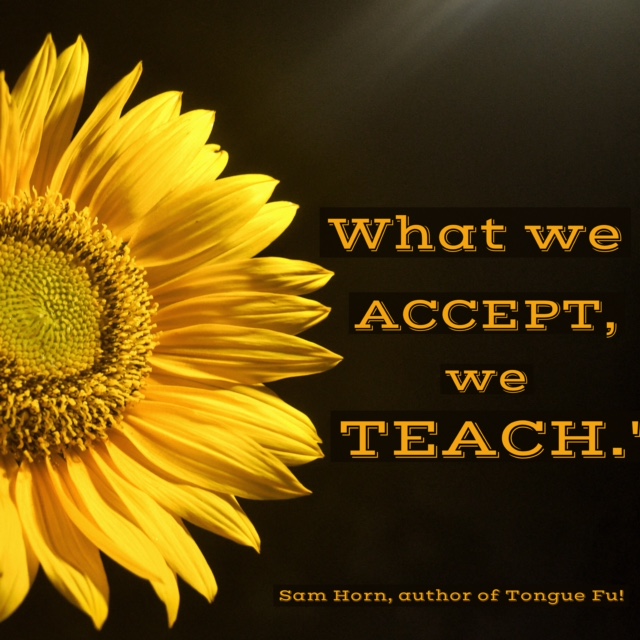
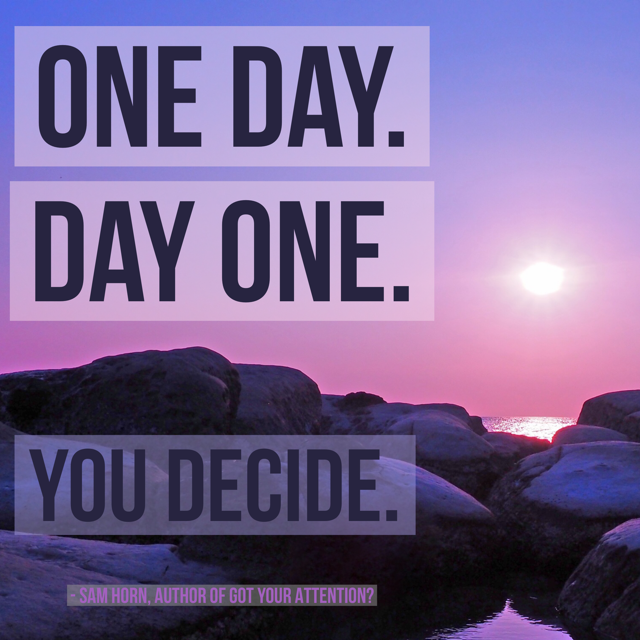
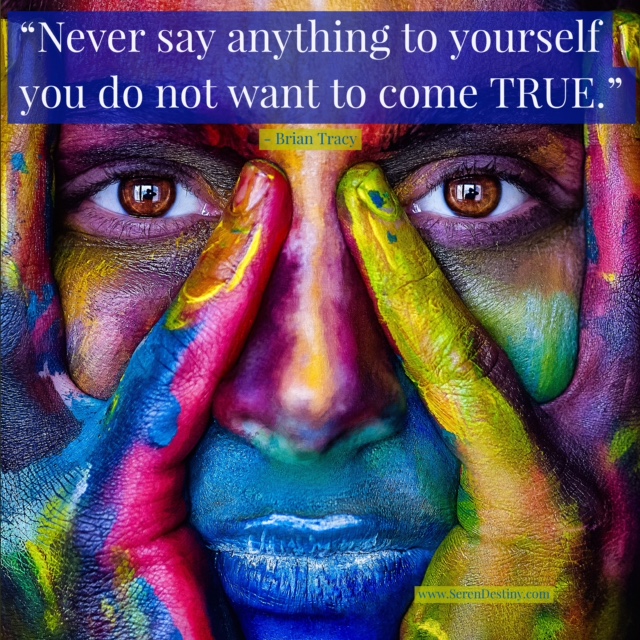
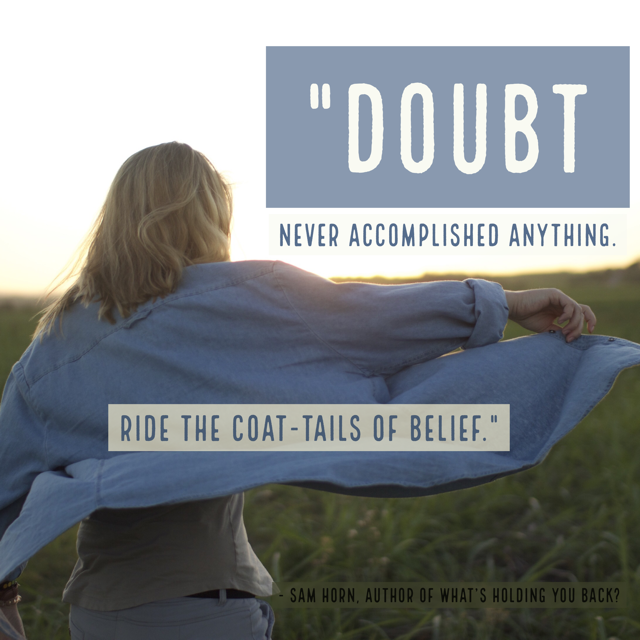
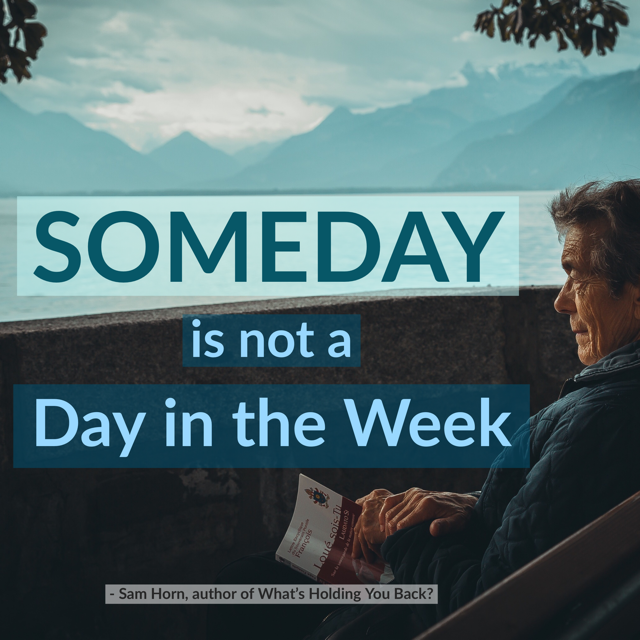
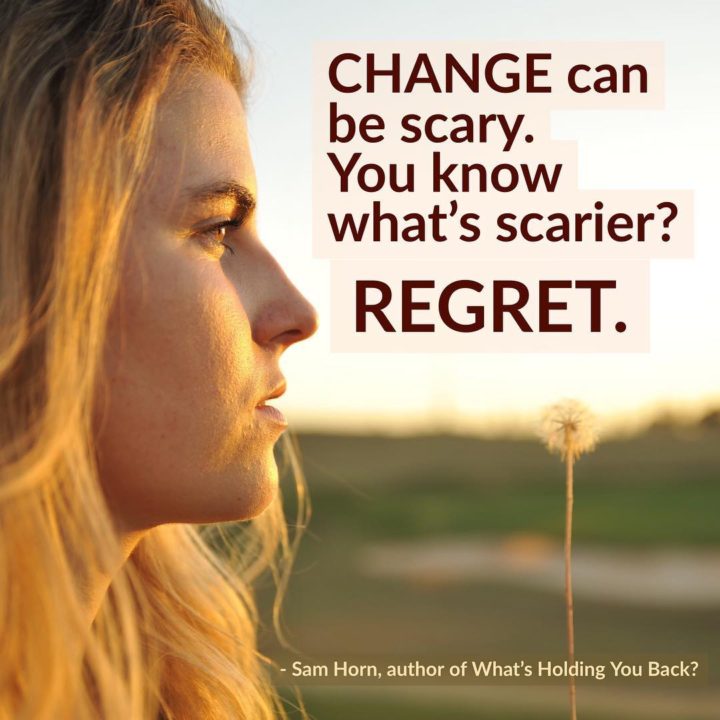
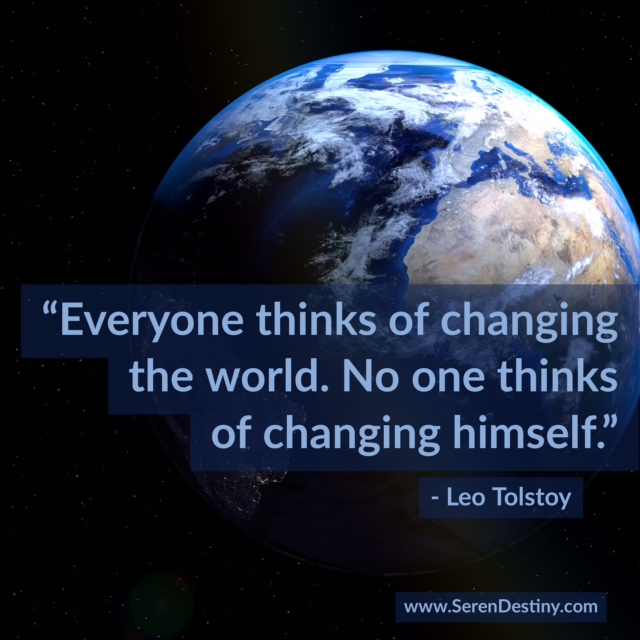

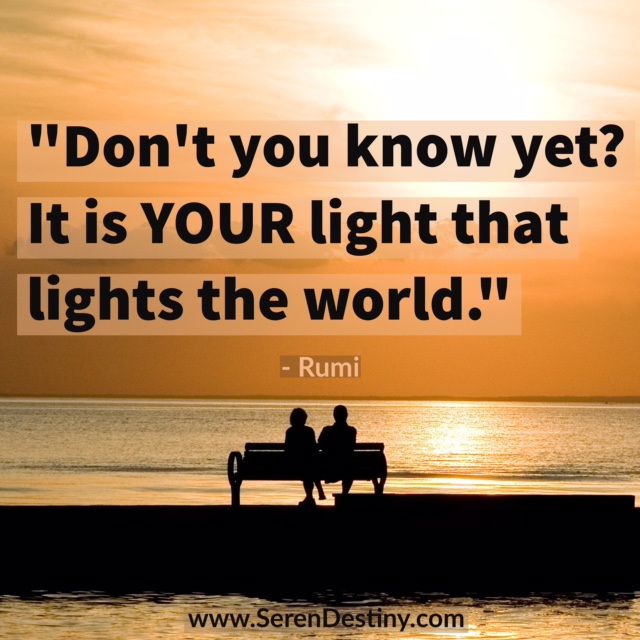
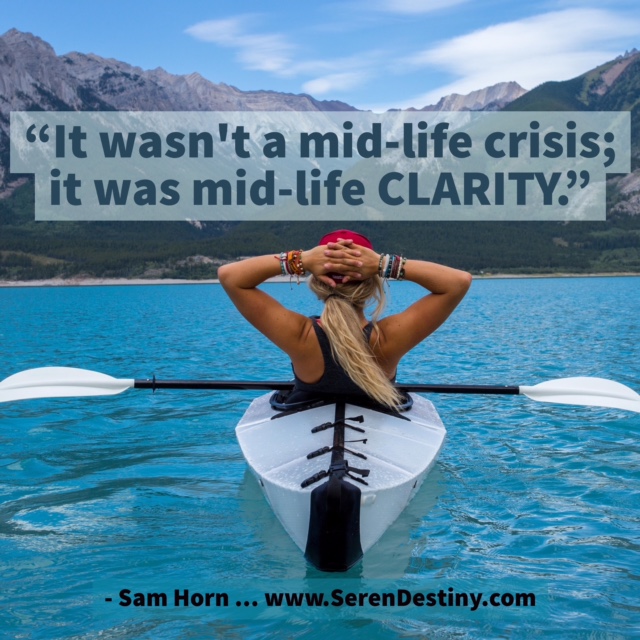
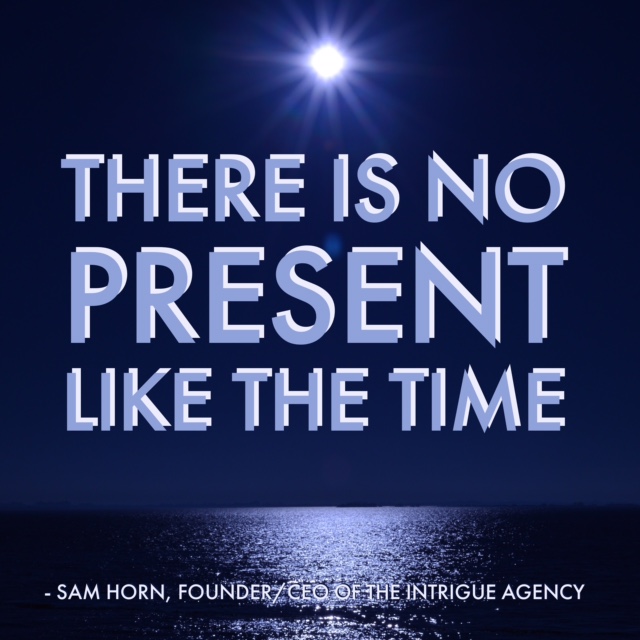
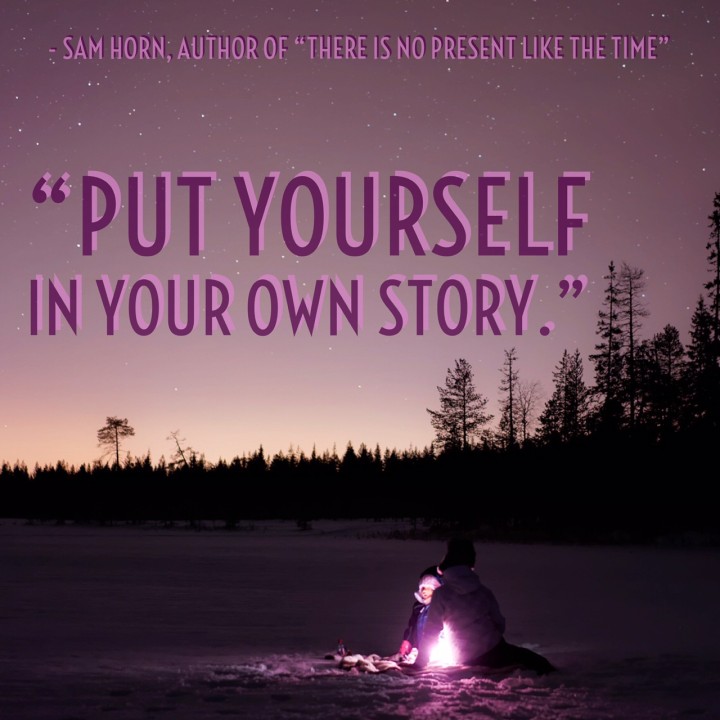
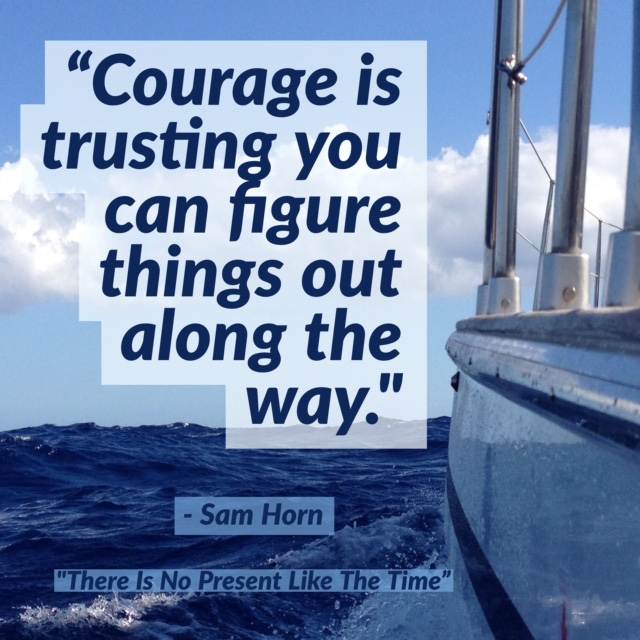
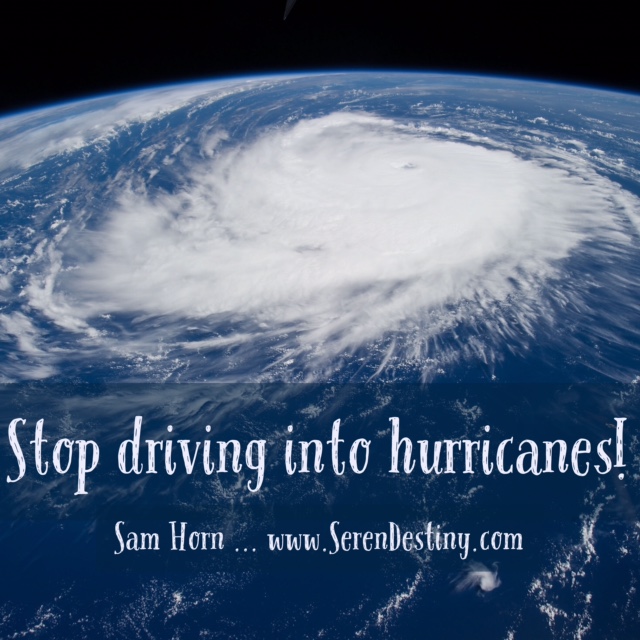
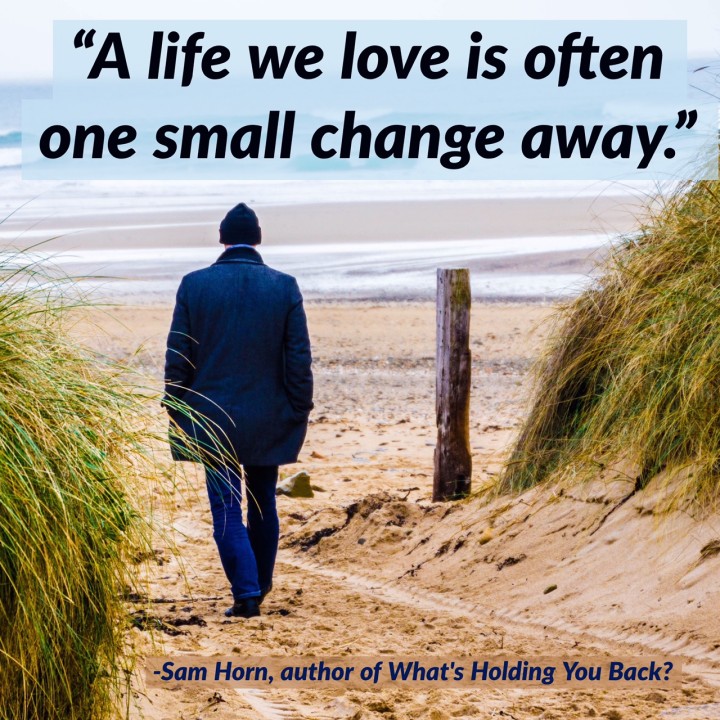
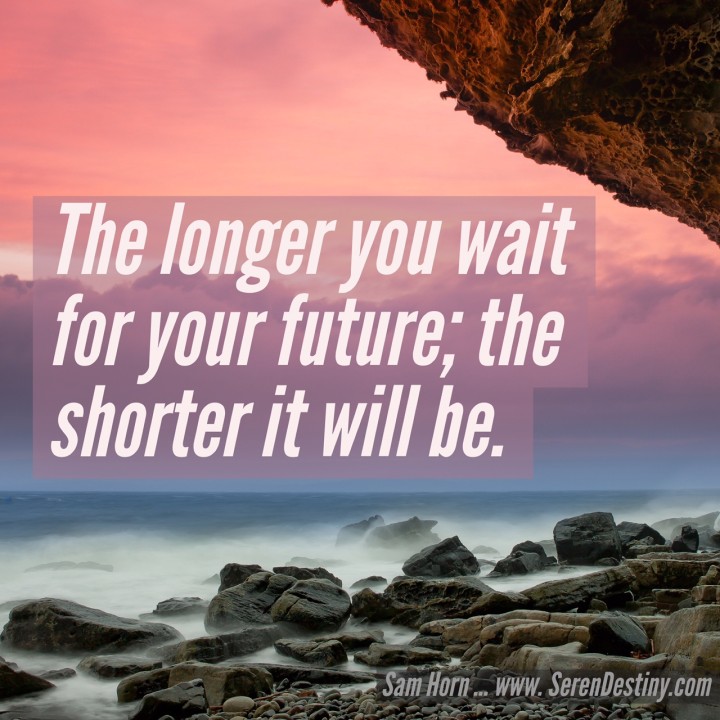 I was at a beach in Kauai over the weekend. A couple next to me said they'd been looking forward to getting into the ocean but it was "too cold." Meanwhile, a little boy waded in and started splashing around. He was clearly having the time of his life. The couple looked at each other, ditched their cover-ups, and were in the water with him a moment later. The moral of the story? Life's waiting. Wade in.
I was at a beach in Kauai over the weekend. A couple next to me said they'd been looking forward to getting into the ocean but it was "too cold." Meanwhile, a little boy waded in and started splashing around. He was clearly having the time of his life. The couple looked at each other, ditched their cover-ups, and were in the water with him a moment later. The moral of the story? Life's waiting. Wade in.